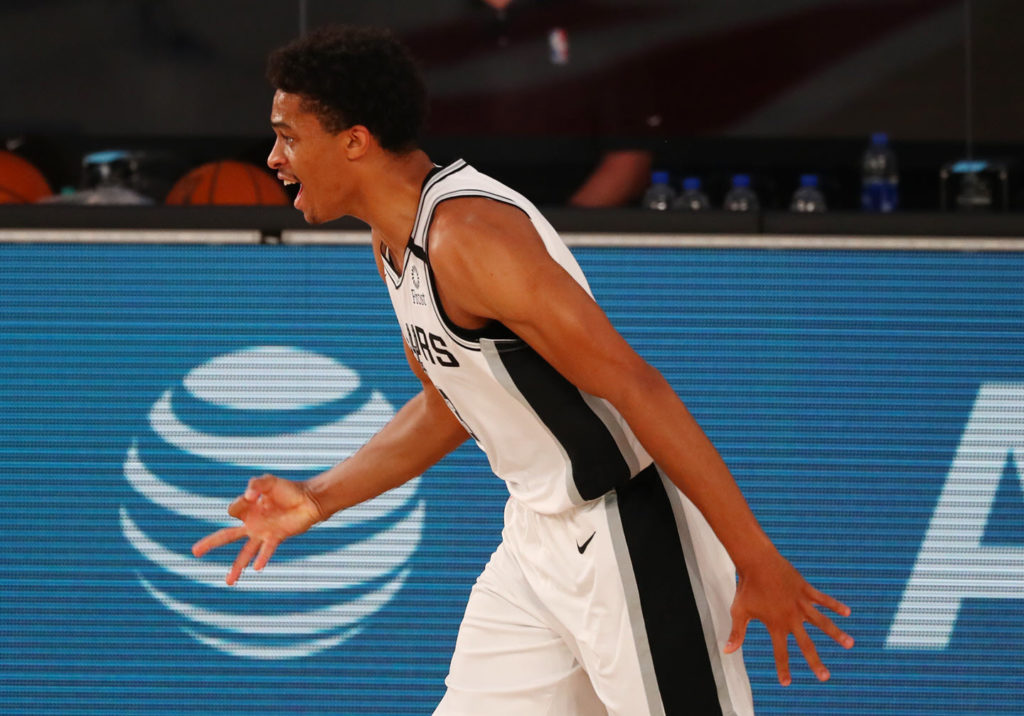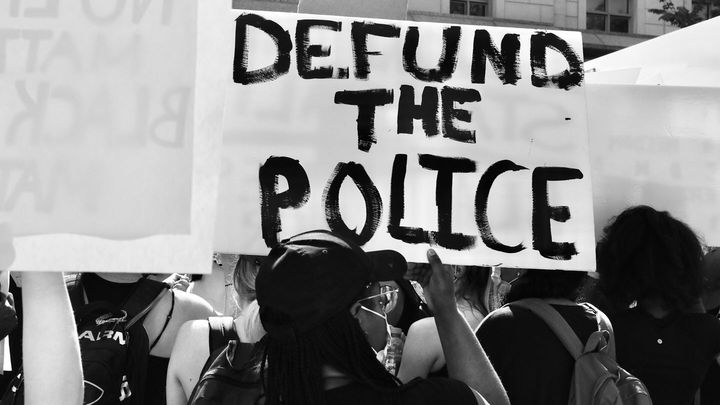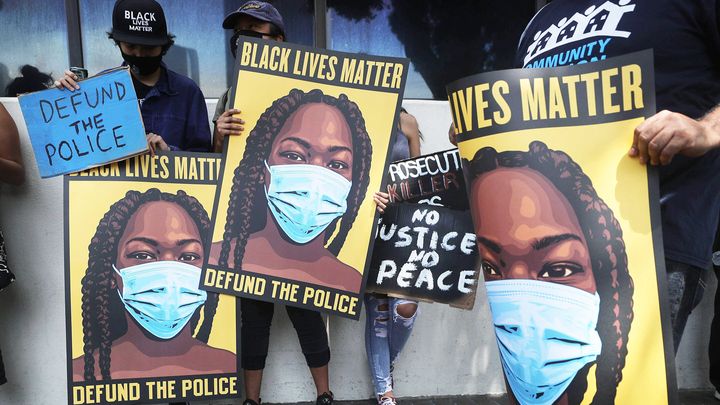The NBA playoffs will resume this weekend, players decided on Thursday, after the Milwaukee Bucks sparked a multi-league strike by refusing to play their scheduled game earlier in the week against the Orlando Magic to protest for justice for Jacob Blake.
The Bucks, and players from other teams that backed their strike, want the league to do more to advance social justice causes after seeing video of Blake’s shooting by police as well as the shootings of protesters by a white teenager. The league painted “Black Lives Matter” on the bubble courts and is letting players wear social justice phrases on their jerseys, but the players said on a joint call Thursday with league owners that they want “organizational changes” including the establishment of a coalition to work full-time on voting issues and police reform, Taylor Rooks reported.
“I would like to see more from the NBA aspect, the teams to partner with and align with more community groups and organizations that have dedicated their time and their life on correcting these issues,” Boston Celtics swingman Jaylen Brown said at a recent press appearance.
The decision of whether or not to resume the playoffs was largely a matter of political strategy and leverage for the players. But for the league, it’s mainly a financial matter. When the regular NBA season was called off in March because of the coronavirus, it was estimated that the league, which is owned by the team owners, could lose about $1 billion in revenue from ticket sales, TV deals, and ads. The return to play will help the NBA recoup at least some of that money.
The latest reports indicate that the NBA has agreed to establish a social justice coalition, as players had requested, and it was announced that league arenas will be turned into polling locations. But when games resume, players will continue to compete besides ads for league sponsor AT&T. Through partnerships with a range of law enforcement entities, AT&T has done more than just about any other company to put its full influence behind law enforcement’s agenda in ways that disproportionately harm Black Lives Matter activists and communities of color.
AT&T is one of a handful of brands whose ads have been consistently displayed on screens around and above the court at games in the Orlando bubble. In February 2019, AT&T and the NBA agreed to a multi-year marketing partnership. Taking over the rights from rival Verizon, the agreement also pushes out AT&T promotion across the Women’s National Basketball League, NBA G League, NBA 2K League and USA Basketball.
According to Gothamist, AT&T has been one of the deep-pocketed corporate donors to the New York City Police Foundation, and it has sponsored and donated to other police foundations in cities throughout the country, including those in Los Angeles, Winston-Salem, Atlanta and San Diego. An AT&T executive sits on the board of the St. Louis Police Foundation.
While defunding the police is a goal of many Black Lives Matter activists, police foundations exist to raise money from private donors like AT&T in order to supplement police departments’ budgets and allow cops to acquire controversial items like military-grade weapons. By funding purchases and programs through their affiliated foundations, police departments avoid the public review process that would take place if they sought funding from city appropriators, including public meetings and competitive bidding. The New York Police Foundation, for example, has provided New York cops with horses, SWAT gear, bomb-detonating robots, and surveillance technology. It also funds the New York Crime Stoppers program that blankets TV and social media with images of suspects, creating a false impression of rampant crime and danger.
In the week after May 31, as protests over the killing of George Floyd gathered in size and intensity, the foundation removed the names of its board of trustees members from its website. A page listing major donors and recognizable corporate sponsors was also taken down at some point.
AT&T is also a “platinum partner” of the National Sheriff’s Association (NSA) through its subsidiary FirstNet, a nationwide wireless broadband network for first responders. NSA is a lobbying group that describes itself as “one of the largest U.S. law enforcement organizations.” Besides its competitor Verizon, AT&T is by far the NSA’s most prominent and influential corporate partner.

NSA is one of the only entities at the federal level that reports lobbying for the permanent continuation of the 1033 Program that allows civilian police departments to obtain weapons and equipment that were designed for use by the military against foreign enemies. Much of the military equipment that police have used against Black Lives Matter protesters in recent months—like Mine-Resistant Ambush Protected Vehicles (MRAPs), Lakota helicopters, and the Long Range Acoustic Device—are among the items that local police and sheriffs receive through the 1033 Program, according to transfer data from the Defense Logistics Agency.
Besides its use against protesters, military equipment is routinely used by cops against communities of color. The American Civil Liberties Union found in a 2014 report that the equipment police obtain under the 1033 Program has been primarily used in the so-called “War on Drugs” and that 54% of the people impacted by SWAT teams employing military equipment and tactics for executing search warrants were black or Latino.
NSA has spent more than $1.3 million to lobby the federal government on issues including the codification of the 1033 Program since 2016. The program was dramatically limited during the Obama administration, but President Trump has reversed those restrictions and allowed the transfer of military equipment to police departments to continue flowing. NSA lobbies specifically to have the program codified, which would prevent a future president from restricting it by executive order.
NSA also lobbies Congress to allow law enforcement agents to continue being able to access domestic emails, texts, and other communications records stored in the cloud without needing a warrant under the Electronic Communications Privacy Act (ECPA). It calls ECPA “an essential piece of legislation that seeks to ensure that telecommunications companies properly work in collaboration with law enforcement” and opposes efforts to modernize the law, which was written in 1986, to apply stronger privacy protections to digital communications records.
Since at least 2007, AT&T has given federal law enforcement agents access to its deep trove of call records for use in counternarcotics operations. Under a program known as Hemisphere, a partnership with the Drug Enforcement Agency (DEA), AT&T provides law enforcement with details like numbers dialed, time, date, and length of calls, as well as location information in some cases. The call records are maintained by AT&T, not the government, and they are handed over to agents upon request and without requiring a court order. Call data for Hemisphere is pulled from all switches operated by AT&T, which means it contains information from communications made through other carriers that use the company’s sprawling telecommunications infrastructure.
“The government pays AT&T to place its employees in drug-fighting units around the country. Those employees sit alongside Drug Enforcement Administration agents and local detectives and supply them with the phone data from as far back as 1987,” the New York Times reported in 2013.
Hemisphere, which is operated for profit by AT&T, is typically used to help agents identify other pieces of information they can obtain legally through warrants, allowing them to bring that information forward in court and keep the information handed over from AT&T, which could be seen as violating Fourth Amendment rights, a secret. “Through a technique known as ‘parallel construction,’ after using Hemisphere, cops devise a second, more conventional way to obtain the information, and put that reverse-engineered method down on paper,” Electronic Frontier Foundation explains.
The War on Drugs has been especially brutal for people of color. Black people are 3.73 times more likely to be arrested for possessing marijuana than white people, despite both groups using marijuana at similar rates, a 2013 ACLU study found. A 2010 report from Human Rights Watch states that “black men are sent to state prison on drug charges at 13 times the rate of white men” and that “two out of five blacks sent to prison are convicted of drug offenses, compared to one in four whites.”
In the last six federal elections, AT&T has given an average of 57% of its PAC and employee contributions to Republicans, including 61.5% of its $2.5 million total in House donations in 2016, according to data from the Center for Responsive Politics. In March, AT&T’s PAC contributed $2,500 to Republican Sen. Kelly Loeffler of Georgia, who has said she “adamantly oppose[s] the Black Lives Matter political movement.” In 2019, AT&T’s PAC donated $3,000 to Republican Sen. Tom Cotton of Arkansas, who called for a military occupation of cities where Black Lives Matter protesters were demonstrating, tweeting on June 1, “No quarter for insurrectionists.”
The company has made gestures towards backing Black Lives Matter. It committed to spend billions with Black-owned suppliers and CEO Randall Stephenson has expressed his support for the movement. But on matters of police reform, its actions are not aligned with the movement that so many NBA players are working hard to support.
Read more from Sludge:
Law Enforcement PACs Give Millions to the Politicians Who Set Their Budgets
Police Foundations Scrub Corporate Partners and Board Members From Their Websites
Poorer Cities Spend More of Budget on Police, Even Where Crime Is Lower
Corporate Backers of the Blue: How Corporations Bankroll U.S. Police Foundations
Klobuchar Worked With Law Enforcement Group to Increase Police Budgets



